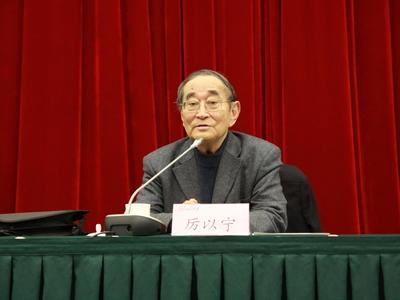Peking University, Beijing, April 20, 2010: On the morning of April 17, “An Elective Course For Cadres in the Bureau Level of the Central and State Committees – An Exclusive Lecture from Peking University” took place at Peking University (PKU). Over 160 bureau-level cadres from 16 bureaus of the Central and State Committees convened at the Alibaba Conference Hall in the PKU Guanghua School of Management’s new building to attend the lecture of renown economist Professor Li Yining, where he analyzed the future of the economy and other hot topics on a macroeconomic level. PKU Deputy Secretary of the Party Committee and Secretary of the Discipline Inspection Commission, Professor Yu HongJun presided the lecture.

“How to view the upturn of China’s economy?” was the opening that Professor Li presented to the audience that coincided with his usual direct and to-the-point demeanor. He believes that even though China’s economy survived the 2008 financial crisis, it is still not fully healed and the investment foundation is not stable. Due to the fact that investments, especially investments from the government, are the key to fully recovering from a financial crisis, the restructuring of the economy is still not complete and the vicious circle of impulsive investing is still present.
“From years of development, the Chinese economy has two characteristics, one being that it is afraid of cold but not hot; and the other being that it is easy to stop but hard to reignite.” Professor Li continued to say that an inflation of currency is also a dormant factor that will affect the economy severely. To solve this problem, we must first define the type of inflation it is, and then place specific policies to discontinue it, but before policy implementation, full consideration of all possible factors should be taken into account.
“What we are most concerned with right now is not just to stop inflation, but to also prevent stagflation.” When considering the relations that economic growth and employment have, Professor Li believes that the rate of economic growth of the Chinese economy should stabilized around 6%, otherwise employment problems that can affect social stability will begin to rise.
On the macroeconomic level, Professor Li talked about the current hot topics: independent innovation, price of housing and the system reform in the city and rural areas. By learning a lesson from the domestic color television and photographic camera industries, he argued that branding is reliant on independent innovation and an innovative model should be formed. In regard to the housing situation, Professor Li said that policies should be made in accordance to the salaries of the high, middle and low classes. There should be economic housing, regular rental housing, regular-priced housing and villas made available. He also believes that the problem that the system reform is trying to mend is a problem inherited from having a planned economy, where we need to especially focus on the issues of urbanization and the expansion of domestic demand.
A division director of the State Administration of Industry and Commerce Yu Fachang said: “Professor Li is a renowned economist. The reason I chose to attend this lecture is so I can learn his take on the future of the Chinese economy. I also hope to have more opportunities to attend his lectures in the future.”
This lecture is the second lecture in a series of 16 that is organized by PKU. In addition to the March 28th lecture, also the first lecture of the series, by Professor Ye Lang titled “Aesthetics and the Realm of Human Life”, this series not only is receiving praise from all walks of life from society, but also from the Organization Department of the CCCPC. This Department will hold a colloquium regarding the test sites for holding elective courses for bureau members on April 20. PKU is scheduled to make a speech.
Translated by: An Jiang
Edited by: Jennifer Yan
Source: PKU News (Chinese)